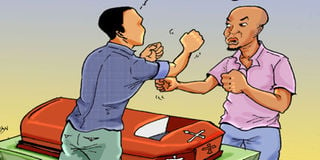Africans can’t cremate their dead since relatives need to fight for the body

Circa 1993. Willy drowned. His drowning shocked many who knew him because it happened at the landing site when he, apparently, jumped into the water to wade ashore. So his mother travelled all the way from Nebbi to Jinja to ‘confirm’ that there had been no foul play.
And how would she ‘confirm’ this? She was no mortician, nor was she a pathologist. But then she could have been both and much more. In African medicine, practitioners went far and did things that can even scare Stephen King -- the American author of horror and supernatural fiction.
Willy was generous in many ways. He would spare the best catch of tilapia for us. It was my duty to ride a Hero bicycle from Kakira to the landing site called Musoli to pick up fish on weekends.
But when he died, my mother would not let me go to the funeral. She never allowed me into such gatherings. She said it was a ‘lisanga ya banganga’ (the meeting of the witches) -- as rumba legends Tabu Ley and Franco would call it. She said funerals attracted many people wearing ‘maseke ya meme’ (horn of sheep) and other fetishes on their bodies.
The fisherman from Nebbi was to be buried at a village near the landing site. Back then, travelling from Jinja to Nebbi took about three days. This made it hard to transport such victims of drowning whose bodies would be bloated.
So I missed the funeral but I heard of the experience “live from my mother.” Willy’s mother arrived and asked to be taken to the gravesite. Here, she spat on her chest, muttered some incantations and then she called out to her son.
The fainthearted fled for dear lives as the dead young man emerged from the grave in a spectre that was more real and “alive” than most of our MPs during the plenary.
The old woman asked him if it was true that a famed swimmer like him had drowned. With tears rolling down his cheeks, he nodded his head. Asked if there had been no foul play, he nodded again.
Then the mother bid him farewell and asked him to take his eternal rest. The body returned into the grave.
And you are wondering why relatives were fighting for the late Bob Kasango’s body? In Africa, people will never visit you in hospital, jail or wherever when you’re battling to stay alive but lose that fight and they will fight for your body like it is the antidote to remove Museveni from power.
Besides keeping the dead for their spiritual bonding, what else do having graves in front of a home achieve? It’s true most people fear the sight of graves yet it is commonplace for homes to be dotted with the same.
Recently, I saw a home in Jinja City whose perimeter wall fencing was given a detour to avoid running it over a grave.
I’m not sure of many things but the poor thing interred there must be very angry with the relatives who probably fought for the dead body back then. If he or she were to write poems, Stella Nyanzi’s rants would be nursery porridge just.
So here I was, with a friend, discussing this matter. Peter is his name. He strongly objected to my idea that Africans should be encouraged to cremate their dead.
“Man, how will cannibals survive when you go that route?” he asked.
I ignored the joke but Peter wasn’t done. “Man, as Africans, we love disorganisation. Do you know how much value land loses when it has dilapidated graves on it? Why should we forego this Africanness in us by cremating when we can turn our homes or land into a mess with just one grave?”
At this point, I was getting irritated but I had to hold it all in as he added: “Whenever witchdoctors are arrested in Masaka, among the evidence is always human skull or femur, where will they get all the fetishes if we resort to cremation?”
Maybe Peter’s warped sense of humour holds. I can imagine Willy’s poor mother wouldn’t have had a way to ‘confirm’ her son had drowned had the body been cremated.





